Massive Tuition Hikes Passed
UC Regents Approve 32 Percent Increase; Students Protest En Masse
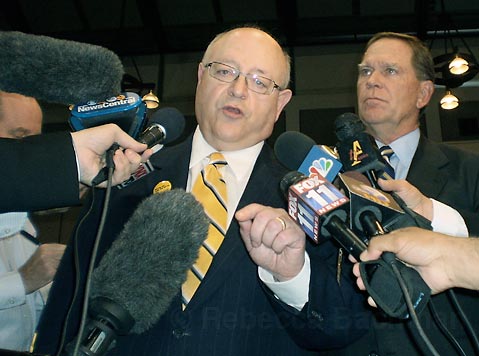
Three days of University of California Board of Regents meetings culminated Thursday, November 19 on the UCLA campus when, to the fear of protesting students and workers-whose furious chants created an eerie effect as they penetrated the third-story walls of the meeting room, the Regents formally passed a 32 percent increase in tuition.
The hike is part of the UC’s plan to close the budget gap resulting from a 20 percent-or $650 million-decrease in state allocations to the UC. In the weeks leading up to the meeting, UCSB students and employees demanded a statement from Chancellor Henry Yang on the proposed tuition hikes, eventually marching on his office. They never got one. “There is no easy solution. It is really not my decision,” said Yang informally at a UCSB parents’ weekend event on November 7. “The regents are faced with this difficult decision : whatever they decide, I support ultimately accessibility and affordability.” All 10 UC chancellors sat at the decision-making table Thursday, where they shared Yang’s bewilderment and refrained from commenting.
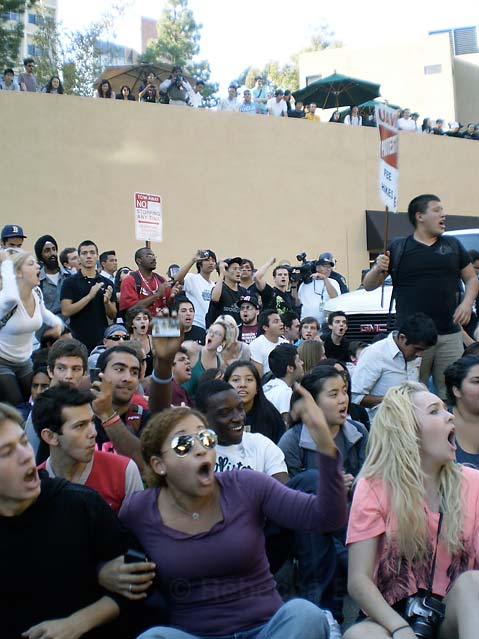
The numbers show that Yang’s referral to the decision as “difficult” was right. State funding for the UC went from $3.25 billion for the 2008-2009 school year to $2.6 billion for 2009-2010. “It’s not pleasant to say, but the students are almost in a lose-lose situation,” said UC President Mark Yudof immediately following voting. “We are cutting to the bone. Now we have fewer sections, larger classes, and there may be more time to graduation if we don’t get these fee increases.” For in-state, undergraduate UC students, who currently pay $7,788 annually ($900 of which is a registration fee), this school year’s increase of 15 percent will be applied to half the tuition portion, and result in fees upward of eight grand for the year. Graduate student tuition will rise 2.6 percent. For both undergraduate and graduate students, the UC will tack on an additional 15 percent beginning summer 2010. For the 2010-2011 school year, in-state fees will total somewhere around $9,500 for undergrads.
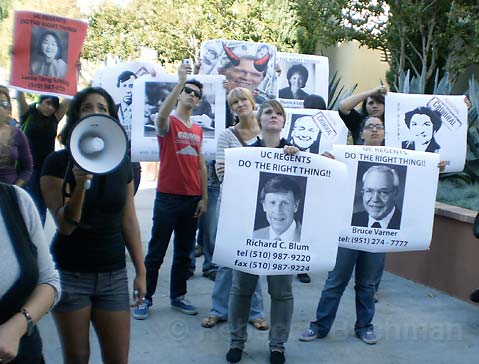
At the November 19 meeting, regents repeatedly explained that the UC’s only sources of income are student tuition and state funding. If state funding goes down, they said, then tuition must come up. If the tuition hike had not passed, according to the UC Office of the President (UOP), the hypothetical budget gap for the UC would be $1.2 billion for the 2010-2011 fiscal year-a number that directly reflects Sacramento’s decision to decrease spending on California public education. Yudof said the UC is not becoming more expensive for the state; the state deficit for the 2010-2011 fiscal year will be $7 billion to $8 billion even with reduced UC funding. “The regents and I-we’re the messengers. We have seen our support from the state go down 50 percent over the last 20 years and by 20 percent within one year,” said Yudof. Indeed, enrollment in the University of California has increased 30 percent since the early 1990s, but the UC portion of the state budget has only risen 2 percent.
Protesting workers and students argued that the increases are not justifiable considering furloughs, which are expected to save $184 million. “The numbers just don’t add up,” said Julian Posadas, a UCSB organizer for and executive vice president of AFSCME 3922, a public employees union. The argument takes into account the $60 million saved so far from UC-wide downsizing. Specifically, the UOP has reported that campuses are “reducing instructional budgets by $139 million, laying off 1,900 employees, eliminating 3,800 positions, and deferring hiring of nearly 1,600 positions, most of them faculty” in the 2009-2010 school year alone.
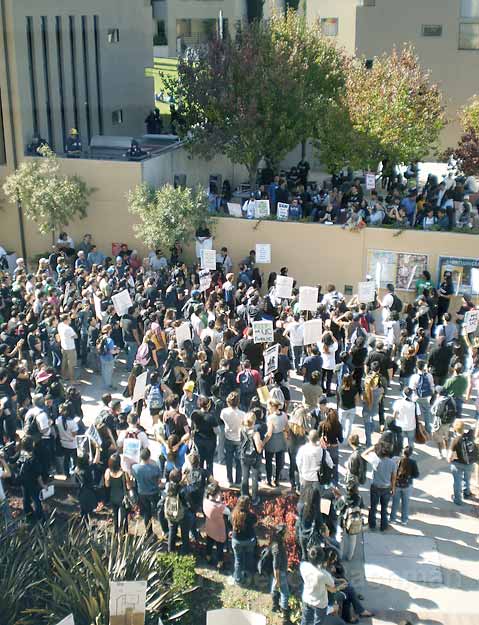
In the face of criticism, the Board of Regents was quick to highlight the Blue and Gold Opportunity Plan, which is expanding its financial support from 51,000 students to 52,000 students in the 2010-2011 school year. A little more than one third of all money generated by tuition increases-$175 million out of $505 million-will go to covering about 32.7 percent of the UC’s total 159,000 undergraduates. Furthermore, Yudof expects increases in UC Grants and Cal Grants to cover fee increases for the 45 percent of students who receive these awards.
A review of all these numbers-to illuminate what it would take, hypothetically, for the UC system to climb out of its financial hole-shows that if the projected deficit from reduced state funding leaves the UC short $1.2 billion, and furloughs and other actions are saving $184 million and $60 million respectively, then the UC is left $956 million short. Project the current furlough saving rate over the next five academic quarters (to the end of the 2010-2011 school year), and another 5 times $184 million, or $920 million, is generated by the UC, leaving only $36 million to go. (It is important to note that Yudof, while not addressing the length of furloughs at the November 19 meeting, has reportedly expressed resistance against continuing furloughs for a second year.) Now take the $505 million to be generated by student fee increases and set aside $175 million for financial aid, and the net gain from increased student fees by the end of the 2010-2011 school year is about $330 million. Finally, factor this $330 million into the $36 million dollar gap, and the UC has more than broken even, making up for the $1.2 billion decrease in state funding with an extra $294 million just in time for the 2011-2012 school year.
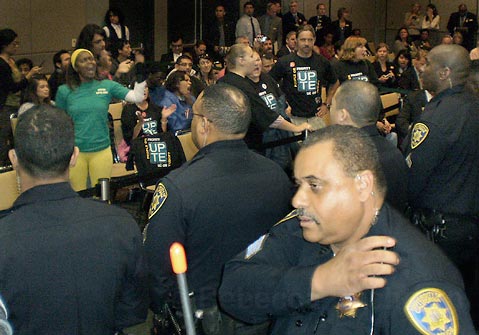
It’s possible-based on our own calculations-that tuition at this point can return to normal, and reduced spending UC-wide can end, returning the standard of education to its normal, excellent state. According to Regent Bonnie Reiss, because the fee hike and reduced spending are directly related to the lack of funding from Sacramento, the only way to reverse damage done is to convince the State of California to reinstate the support that it has recently withdrawn-a difficult task considering the state government’s own growing deficit. UC Regents are asking for $913 million for the next fiscal year.
[CLARIFICATION: Originally, the article suggested that UC-wide furloughs would continue through the 2010-2011 school year and that student tuition would return to normal in the near future. The text has been changed to accurately reflect that UC President Mark Yudof indicated furloughs will not necessarily continue into a second year, and that the return to lower tuition costs is simply a hypothetical, according to the author’s own calculations.]
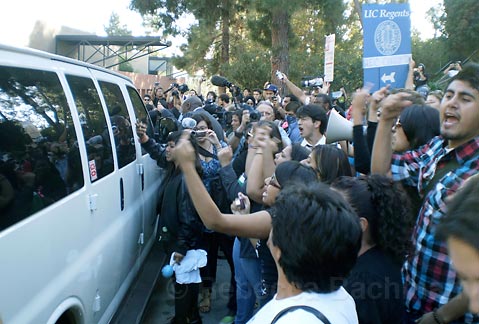
It is with somber acceptance of this statewide lack of money that Jesse Bernal, this year’s student regent, who is working on his PhD in Education at UCSB’s Gevirtz School of Education, explained his choice to vote unaccompanied against the tuition hikes. “I understand some of the real-life implications of the decision : I’m the only regent who’s on campus, taking classes, every day,” he said. The student regent serves a one-year term, attending all meetings of the board and voting on all issues. “This is the only time that I have voted differently from them,” Bernal said. He also mentioned that this was the most controversial issue the regents have faced in his experience, and added that the UC Students Association is inviting all UC students to march on Sacramento on March 1 to press the urgency of restored state funding.
During the meeting, after several heartfelt pleas from students and workers got out of hand and police removed the rowdy protestors from the meeting room, Yudof explained how financial aid would cover tuition for students with family incomes of up to $70,000-well over the state’s median family income. “As you go up the income scale, it gets harder,” Yudof said. “Between $70,000 and $120,000 we take care of half of it in the first year : Over $180,000 you’re on your own, so it’s really more of an upper-middle class issue.” The regents also introduced Project You Can: All 10 campuses have committed to raise $1 billion from the private sector, doubling private support. Regent Sherry Lansing expressed the need for these facts to be publicized.
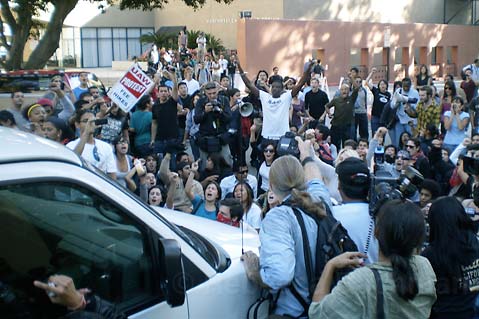
Indeed, thousands of protesters-almost 400 of whom were UCSB students-were unaware of this support as they continued protests at UCLA’s Covel Commons hours after the decision was made. They chanted “Shame on you!” up at the windows out of which regents peered, apprehensive to leave. Some ran, surrounded by police officers, to vans that would have safely transported them to their cars had furious mobs not blocked the streets. Yudof’s reflection from earlier in the day rang true: “Pat Brown and Clark Kerr would not be happy with today’s developments.”



